Meet Medibyte - A Decentralized Electronic Health Record System
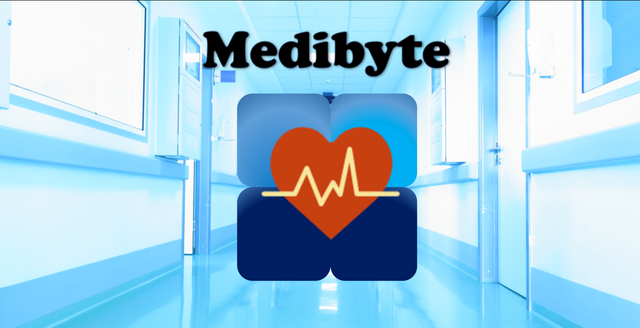
At the invitation of the highly industrious and renowned @officialfuzzy, I am writing this post to introduce a brand new Blockchain project which I am planning to undertake with my IBM colleague, Ian Balina, as well as with @officialfuzzy and the BitShares development team. Before diving into the core of our project, I would like to describe my background in order to tie my credentials and existing work to this exciting new venture.
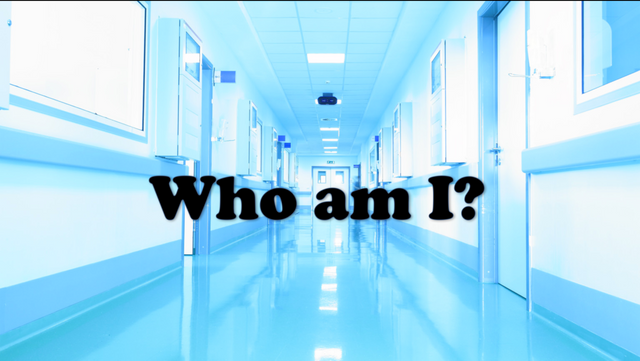
Most of you already know me (or are starting to know me) as @cerebralace or Ace, but my name is Asad Mahmood. I’m a Biomedical Engineer, a Computer Scientist and a Medical Doctor who is currently working at IBM Federal Healthcare as an Analytics Cloud Solutions Specialist, building cloud based machine learning applications for Federal Healthcare agencies. These Federal Healthcare agencies include Civilian Healthcare (e.g. NIH, FDA, CDC) as well as Defense Healthcare (e.g. DHA, MHS, VA).
After working in Internal Medicine in Washington D.C., I joined IBM Federal Healthcare last year and have developed a number of applications using Open Source and IBM Cloud services. These applications include an exploratory analysis of the Zika epidemic in the U.S. states and territories, an open source web application known as Virtual Doc, which uses Spark Machine Learning to determine real-time diagnoses for new patients, and a cognitive application powered by IBM Watson known as Cognitive Health, which computes a patient’s Behavioral Health profile comprising of a psychiatric diagnosis, suicide risk score and real-time social media personality analysis.
Thus, you can consider me as a “Doctor-Engineer” who likes to roll up his sleeves and develop new applications to solve problems related to healthcare and clinical medicine. I am not partial to any particular technology since my overall goal is to design a comprehensive solution that completely solves the problem and rectifies the concerns of the users.
Believe it or not, the inspiration for this new Blockchain project came from a project which I was recently working on for Military Medicine. In the midst of this project, I learned that several Military Medicine agencies (as well as Civilian Healthcare organizations) are in the market for a more secure, open and cognitive Electronic Health Record (EHR) system. If such a system can be developed, it will not only signify greater convenience and access for patients to their health records, but it will also prove to be a great time-saver for physicians bereft of the necessary time needed to locate all relevant pieces of a patient’s medical history and appropriately diagnose.
I’m sure that my very intelligent Steemit audience has already started to ascertain the subject of our Blockchain project, but I would like to first delineate the difference between an EHR and an Electronic Medical Record (EMR) system before the big reveal.
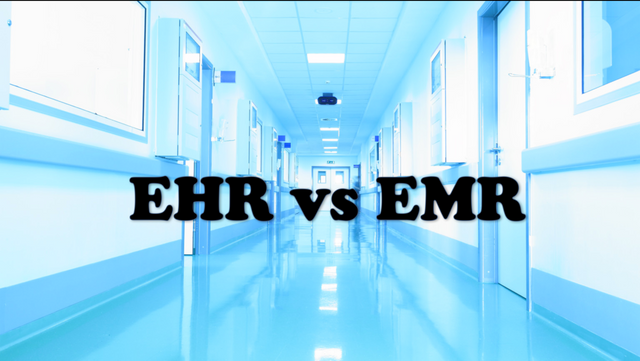
Although the two terms are often used interchangeably, an EMR is quite literally a system that records a patient’s medical history, which includes their chief complaints, medications, diagnoses and treatments. However, unlike its counterpart, an EMR does not take into account other relevant pieces of a patient’s health history such as allergies, lab results and radiology images (e.g. X-rays, CT scans, MRI) and is used purely to determine diagnoses and treatment. Moreover, an EMR cannot travel outside of the hospital and cannot be passed to another provider. Essentially, an EMR is an electronic version of a patient’s chart.
On the other hand, an EHR is an electronic record of a patient’s complete health history, which includes chief complaints, medications, allergies, diagnoses, treatments, consultation reports, radiology images, lab results and more, and can definitely travel with the patient from provider to provider, hospital to hospital, and across state lines as well.
Now that we are all on the same page, it is finally time to reveal the identity of our brand new Blockchain project – sit back, grab some popcorn and prepare to be amazed!
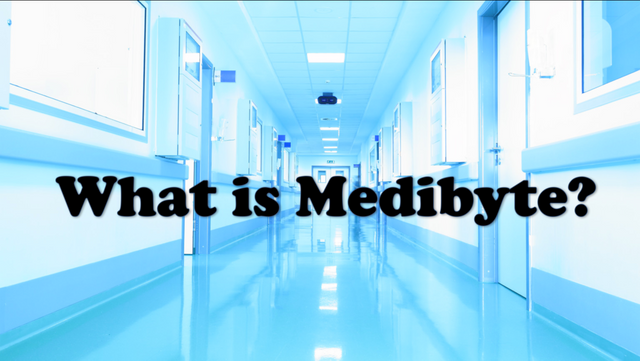
We will be creating a Decentralized EHR on the Blockchain, which will be known as Medibyte. Essentially, Medibyte will allow a patient’s health information – chief complaint, medications, allergies, past medical history – to be recorded in a medical record which will be divided into blocks and stored on the Medibyte blockchain. Each patient medical record can not only be accessed by that patient alone, but can also be quickly queried and accessed by their provider.
Moreover, Medibyte will use open source machine learning algorithms in order to determine the most likely diagnosis for each incoming patient and include this predicted diagnosis in the patient’s medical record. This will then be used by the physician in order to focus the physical examination (a more specialized organ system exam versus a general exam) as well as quickly determine which diagnostic tests are most relevant for a specific patient.
Thus, Medibyte will allow health care practitioners to capture and record all relevant features of a patient’s medical history and store them on the Blockchain. Each patient record, which will also contain lab results and radiology images ordered upon admission, will then be subject to Medibyte’s machine learning capabilities to determine a real-time diagnosis that will be used by the physician to focus their examination and more accurately determine a treatment.
Since each medical record will be divided into a series of encrypted blocks, each patient’s medical information will always remain secure on the Medibyte blockchain and quickly accessible by both patients and healthcare providers. Moreover, patients will be able to update their health status at any time of the day by sending notices of any new symptoms or chief complaints to Medibyte. Their physicians will be immediately notified, given that all patient-initiated changes will be stored as reports on the blockchain, and will thus be able to keep track of all of their patients 24/7.
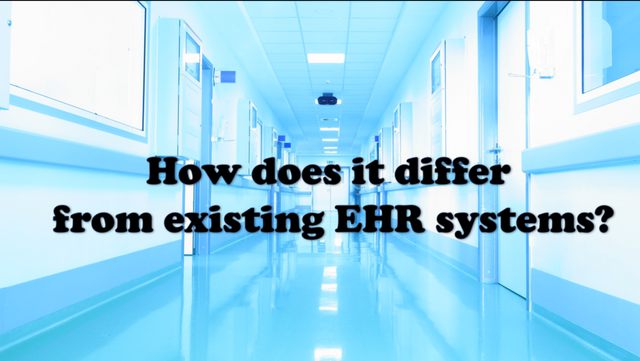
While there are many EHR systems used around the world, the two top ranked EHR systems in the United States are Cerner and Epic. While Cerner was recently adopted by the United States Department of Veteran Affairs (VA), Epic doesn’t lag too far behind it since it houses records of roughly 54% of U.S. patients and 2.5% of patients around the world.
Cerner and Epic are centralized health record systems which expose sensitive patient health information (PHI) to these medical software companies. Yet due to supposed security reasons, these EHR systems don’t even allow patients to view their own medical records!
Moreover, all of these EHR systems promise to save physicians valuable time by providing all facets of a patient’s health history with a few easy clicks. As a doctor and Biomedical Engineer, I have used these obtuse software packages plenty of times to know that they are anything but easy to use! A simple two-minute check of labs and imaging often turns into a prolonged lag session lasting over 10 minutes. By the time a physician is able to successfully recover the results from the system, it’s already time for the next patient!
And contrary to the intended purpose of connecting medical records across hospitals and across different parts of the country, these EHR systems are often siloed and unable to connect to systems in other hospitals. So if you are looking to transfer a patient to another hospital with their entire medical history, forget about it! You’ll have to either send a hard copy with the patient or separately fax over each page!
Since it will be decentralized and exist on the Blockchain, Medibyte will provide open access for all patients to access their medical records at any time. Only patients and their physicians will be allowed to access sensitive medical information at any time – no PHI will ever be revealed to anyone else on the Medibyte blockchain!
Medibyte will also save physicians a great deal of time by providing complete patient medical histories, labs and imaging results as well as predicted diagnoses that will allow physicians to concentrate their examinations on specific organ systems without ordering any unnecessary diagnostic tests. This will in turn save patients a great deal of money as well!
Finally, Medibyte will enable patients and providers to remain connected and gain easy access to all vital health information 24/7 even with transfer of care to other providers in hospitals in different states and across the world!

I hope that this introductory post packed quite a punch and has you excited to learn more about Medibyte! I will continue to deliver more information and news about Medibyte in smaller bits (or should I say bytes?) as we start to assemble the team and begin development of the prototype. It is my goal to work closely with the BitShares development team to create a prototype by the end of this year, ideally before SteemFest this November. In the meantime, stay tuned to the next post in which I will dive deeper into the design and architecture of Medibyte.
References:
Until next time, keep acing life!

Welcome, awesome project and congrats on selecting the best blockchain tech in the world! Bitshares/Graphene can provide the speed and scaling this type of database will need. Upvoted and followed, look forward to watching your progress!
Thank you very much @johnsmith! I greatly look forward to working with the incredible Bitshares dev team in order to build out a prototype which we will happily showcase to the entire Steemit community!
This is a tremendous initiative and Im glad I came across your feed. So many exciting projects tackling real problems and providing real solutions.
I would like to know more on how to go about getting Graphene blockchain developers to work on a solution for the Pharmaceutical Supply chain space.
If you or anyone else has some info that can point me the right direction it would be highly appreciated.
Thanks for reading @sneakgeekz! I'm all about finding solutions to real world problems and with this project, we are hoping to find an open, decentralized solution to EHR and healthcare in general. We will keep you all posted every step of the way and any new information that we uncover, we'll let you know!
Oh God lets do a competition for your logo :D
Definitely, this is just a placeholder for the awesome logo we'll eventually have!
This is very interesting. I work with Big Data (Hadoop) and continue to be very interested in how block chain and big data can be used together given the power of ML and it ability to run compute at massive scale on Hadoop. Metadata opportunities of creating granular patient population pools is something intriguing as well. As Hortonworks (HDP) and IBM are partners I would personally be interested in exploring this further as to where this could go. Interested? Thanks again for the great work. Tony
Awesome! I'm looking forward to your next posts. I hope you lay out:
Good post
Thanks @hamzaoui!
U are welcome
This comment has received a 0.15 % upvote from @booster thanks to: @hamzaoui.
This comment has received a 0.16 % upvote from @booster thanks to: @hamzaoui.
Such an exciting project! I've been seeing firsthand the inadequacies in our health records system while preparing to apply for medical school and have been looking for someone to start a blockchain based system. I will definitely keep up with your progress and wish you the best of luck! Followed and resteemed. I'm super excited to see how this turns out!
Thanks @killak! I wish you the best of luck in your med school application process. Definitely I will keep you all posted each step of the way!
Totally understandable if this is a trade secret but is there going to be a sort of semi-central yet secure place where the records are updated where physicians and patients log in or is every new test/image sent through the blockchain? Sorry if this is a beginner question. I'm still a total newb when it comes to blockchain. I feel like I kind of have the basics from talks I've heard from Nick Szabo and others but I know I still have a lot to learn.
Excellent question @killak! Over the next series of posts, I will try to detail the process step by step, especially when we get to the technical discussion. Stay tuned!
It's surprising we haven't implemented a system using AI to index and compile health outcomes based on complaint or symptom. The use case is apparent. The fact that patients don't have access to their own medical records is just downright embarrassing. When I first wrapped my head around blockchain and the wheels started spinning, instantly medical records popped into my head, as well as credentials like university degrees or certifications. I am so impressed with your writeup. I've been following Patientory for a while and I'm glad to see some healthy competition out there.
Thanks @syne - it's time to use the blockchain to revolutionize the EHR system!
Followed and Resteemed👍 Really looking forward to updates on how Medibyte progresses. Wish you and the team all the best!
Thank you very much @victorpapa! We'll keep you posted every step of the way!
Medical records need to be on a blockchain! Great post!
Most definitely - thanks @rawpride!